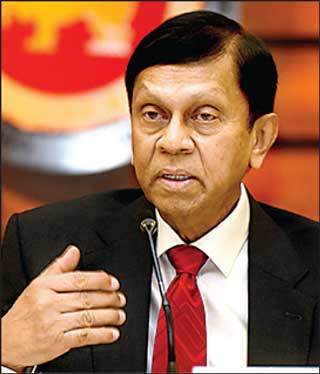Thursday Feb 19, 2026
Thursday Feb 19, 2026
Friday, 15 October 2021 00:00 - - {{hitsCtrl.values.hits}}
By Nisthar Cassim
The Central Bank of Sri Lanka (CBSL) yesterday allayed undue fears and misinterpretation of forex reserves situation in the country, saying the somewhat distressing situation is “under control” as efforts are ongoing in a
 |
| Central Bank Governor Ajith Nivard Cabraal - pic by Ruwan Walpola |
dynamic process to improve the status quo.
CBSL’s net forex position had reached a negative level with $ 400 million in payments in July than the country’s reserves, which had fallen to $ 962 million in August.
However, CBSL Governor Nivard Cabraal said this negative position is not a finality, but a misrepresentation of the situation. He also ruled out the situation was a first for the country. He indicated there had been over 15 instances when the country had a temporary negative net position.
“One transaction can reverse a negative situation to positive,” Cabraal told the media following the October monetary policy review.
He revealed that gross foreign reserves at present amount to $ 4.1 billion, inclusive of the $ 1.5 billion swap facility from the People’s Bank of China.
Though admitting that the globally unprecedented COVID pandemic has caused distress to Sri Lanka’s reserves, he said that the situation was under control as the CBSL and the Government are engaged in a dynamic process to improve the status quo.
“We outlined our measures to shore up reserves and by how much in our short-term road map presented on 1 October,” Cabraal emphasised.
He also said that despite challenges, Sri Lanka has serviced $ 6 billion worth of foreign debt so far this year on top of an equal amount paid in 2020.
As per the CBSL’s short-term Road Map, Sri Lanka is estimated to get nearly $ 7 billion in foreign inflows between October and December and $ 11 billion between January and March next year. Sri Lanka has $ 5 billion in foreign debt repayment next year and a further liability of $ 25 billion between 2023 and 2027.
The CBSL, as well as the Government, has ruled out seeking emergency support from the International Monetary Fund but rely on home-grown and workable solutions.
